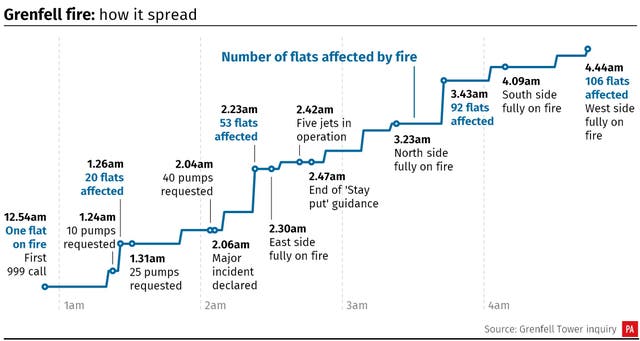
A fire control room manager on the night of the Grenfell Tower blaze became “increasingly uncomfortable” with the stay-put policy and abandoned it within 15 minutes of her arrival.
Joanne Smith, senior operations manager for the London Fire Brigade (LFB), was on call on June 14 last year.
After listening to operators’ calls and becoming aware of deteriorating conditions inside the tower, she made the “quick-time” decision that residents should be told to evacuate if able.
In a written statement to the public inquiry into the blaze, she said: “I had arrived at Stratford at approximately 2.15am – within 10 to 15 minutes the decision was made to change policy and that decision was mine.
“This would have been at approximately 2.30am-2.35am.”
The inquiry previously heard that the stay-put advice was officially abandoned at 2.47am – almost two hours after the first 999 call.
Ms Smith said she told Adrian Fenton, the deputy assistant commissioner responsible for the Brigade co-ordination centre, they should consider changing the policy.
It was, to her knowledge, the first time such a decision had been made.
She went on: “The decision was made owing to a variety of factors – the duration of calls, the content of the calls and the resources available.
“These factors and my years of experience formed the basis of my rationale and coincided with the recommendations following the Lakanal fire in 2009 in which certain questions were asked by the CROs (control room operators) regarding smoke and fire levels.
“The information that was fed back by the CROs from residents and the conditions they were in led me to believe that they had no way of waiting to be rescued.”
Once the decision was made, the new advice was passed to residents on emergency calls and fire personnel on the ground were notified.

Residents were advised to “get out, hold hands and get wet towels to put around themselves”, and control room operators were told they may need to adopt more “forceful and blunt language” to emphasise the necessity of evacuation.
Phone operator BT was also made aware of the change so it could advise residents what to do.
Ms Smith said from 2.30am until 4am the influx of calls was “utterly relentless”, and described staff as “broken” by the night.
They were “incredibly worried” the building could collapse, and the senior staff made a “collective decision” not to show any coverage of the fire on the television.
A total of 344 calls relating to fire were received by control room operators, a log seen by the inquiry showed.
The inquiry heard that control operators would not know what floor or flat fire crews were at, and would not be able to be more precise than letting residents know firefighters had reached the premises.
Counsel to the inquiry Richard Millett QC asked Ms Smith if it was the case that reassurances passed to trapped residents were based on “quite limited information”.
She replied that in most incidents, firefighters would arrive and make contact with the caller within 10 minutes of the call.
He also highlighted extracts from an LFB policy document which said it was “vital” those in the control room were kept informed of what was being done to reach those on the end of the phone.
Asked if she felt this was carried out in practice, she said: “No, we are very rarely kept informed of the actions to resolve FSG (fire survival guidance) calls in my experience.”
“I have never been in a control room where that’s happened,” she added.


Comments: Our rules
We want our comments to be a lively and valuable part of our community - a place where readers can debate and engage with the most important local issues. The ability to comment on our stories is a privilege, not a right, however, and that privilege may be withdrawn if it is abused or misused.
Please report any comments that break our rules.
Read the rules here